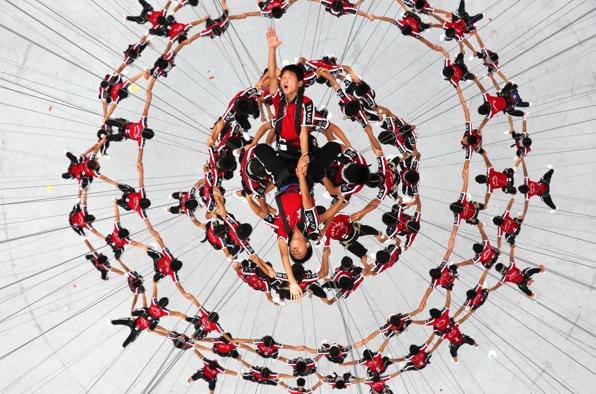
Performers from the Shaolin Tagou Martial Arts School rehearsing on Aug 9 for the ‘Build the Dream’ show in the opening ceremony of the Nanjing Youth Olympic Games. They’re to perform again on the special section of the Closing Ceremony on Aug 28.Chen Xiaodong / For China Daily
Students of major martial arts school endure tough training for high-wire act at Youth Olympics show.
He was one of the performers during the opening ceremony of the Nanjing Youth Olympic Games on Aug 16, but Yuan Jia did not know how stunning their wire stunts were until he saw the show himself on TV the next day.
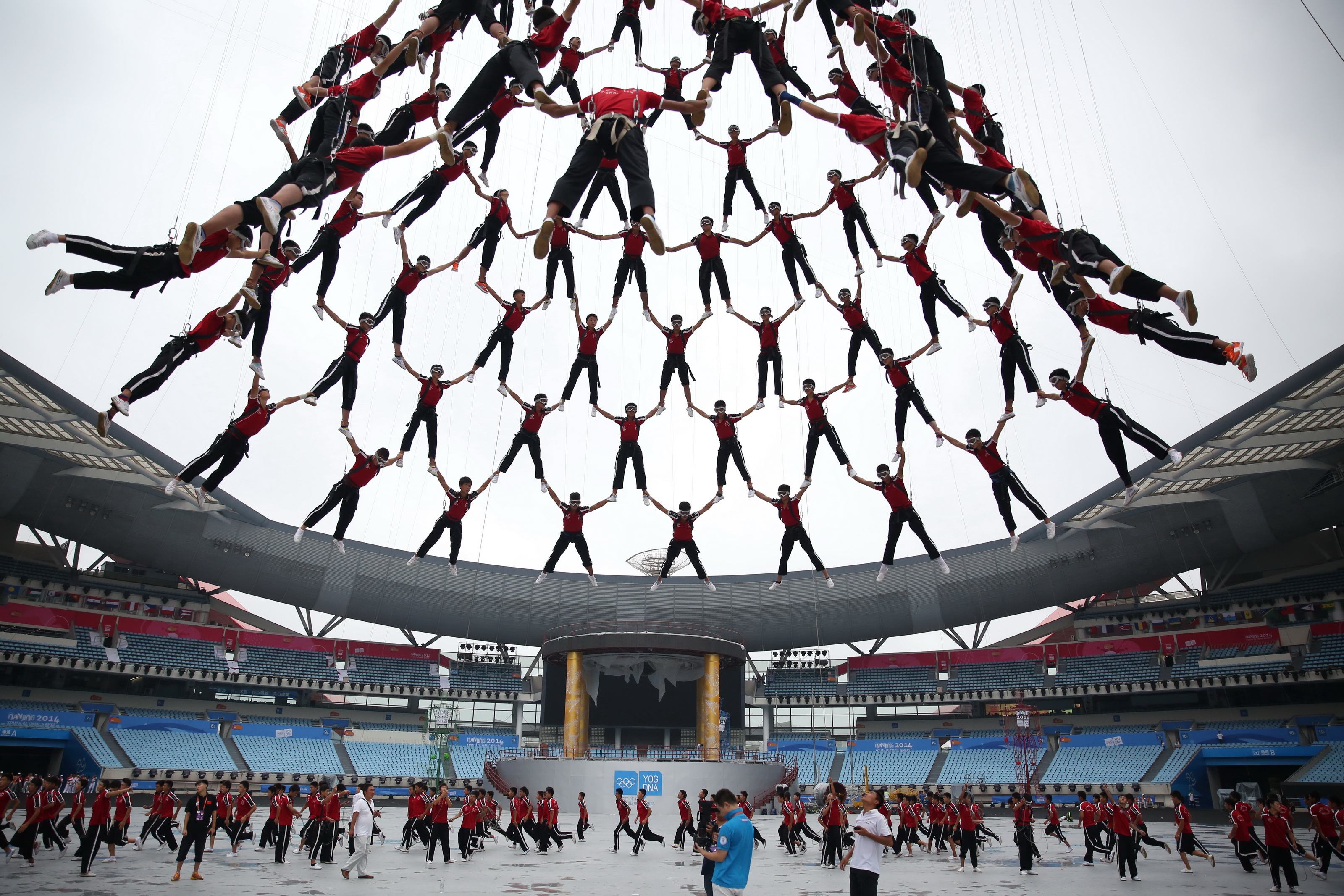
Performers from the Shaolin Tagou Martial Arts School rehearsing on Aug 9 for the ‘Build the Dream’ show in the opening ceremony of the Nanjing Youth Olympic Games.Chen Xiaodong/For China daily
“I knew we did it because we heard the cheers from the crowd (while being hoisted up). But when I saw the entire show on TV, I was like ‘Wow! How did we manage to do it?’
“All the pain and sweat paid off.”
Yuan, 17, is a student of the Shaolin Tagou Martial Arts School near the famed Shaolin Temple.
Despite the heavy rain on Aug 16, Tagou’s high-wire act featuring 120 highly trained martial arts students in various stunts and formations drew thunderous applause from the 60,000-strong crowd in the Nanjing Olympic Sports Center Stadium.
Many fans started looking forward to the students’ next performance, this time at the closing ceremony of the Youth Olympic Games on Thursday.
But Tagou’s heart-stopping performance in a perilous downpour also generated controversy.
When reporters later asked about the risks involved in the acts, opening ceremony director Chen Weiya said the show would go on “even if blades rained from the sky”.
Chen’s remarks drew intense criticism but the student performers supported their director.
“If the show had been canceled because of the heavy rain even though we had practiced and gone through the rehearsals, it would have been the ultimate disrespect for our hard work,” Yuan said.
“We’ve come so far in preparing for the show and we won’t let anything stand between us and its perfect completion.”
Practice makes perfect
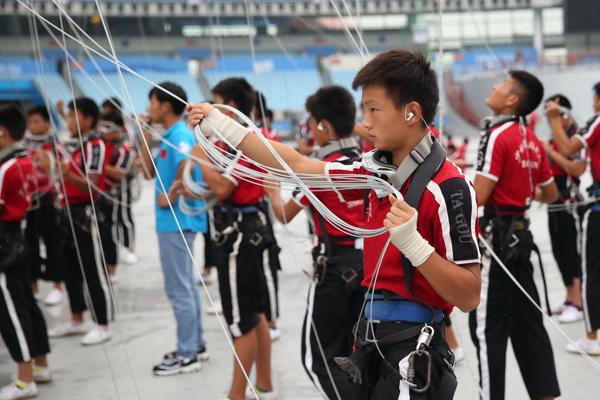
Performers from the Shaolin Tagou Martial Arts School rehearsing on Aug 9 for the ‘Build the Dream’ show in the opening ceremony of the Nanjing Youth Olympic Games.Chen Xiaodong/For China Daily
The Shaolin Tagou Martial Arts School picked the final 120 performers for the show from 35,000 students through a strict selection process that assessed their strength, flexibility and stamina, after accepting the assignment from the Games organizers on March 8.
Before arriving in Nanjing for the in-stadium practice on July 1, Yuan and his peers had practiced day and night in Henan province for more than 100 days, mostly to build their strength and flexibility.
Starting at 8 am, students went through three training sessions in the morning, afternoon and evening, spanning almost 10 hours excluding meal breaks.
The training was much more intense than what they were used to in regular classes.
According to Miao Pandeng, one of the school’s coaches, students had to complete 500 push-ups and 500 sit-ups every day to improve their arm, abdomen and lower back strength to be able to switch formations while being hoisted on wires without support.
It was grueling work for what amounted to a mere 10 minutes on stage.
Although the official final performance featured 30 different stunts and moves in the air, students prepared for more than 100 options on the ground.
The biggest challenge was getting used to the handstand position, which had to be maintained for as long as 30 seconds in the official show.
“It’s really hard to maintain the pose while staying composed and hung up in the air. You can easily get dizzy and throw up at the beginning,” said Huang Yikai, another 18-year-old student performer in the show.
To overcome the “upside-down” challenge, students practiced handstands on the ground in pairs. One student kept the pose while another would hold his feet for at least one minute before taking turns. They completed eight such sets in every morning session.
“It’s actually not that hard for us to hold the handstands as that’s one of the fundamentals for martial arts. But to do so for that long and at that height, that’s really tough to get used to,” Huang said.
Another challenge came from being hoisted on the wires. Hoisted high in the air for about two hours a session, Yuan, who has practiced martial arts for three years, said he suffered from periodic numbness in his thighs as the harness that raised him was too tight.
“Sometimes you couldn’t even feel your legs after a day’s practice,” he said.
“It took a while of swinging and massaging them before you could walk again.”
Students also had to endure the heat from training outdoors under the blazing sun in Nanjing, which is famous for its high temperatures in summer.
Still, the Tagou students have learned to stay upbeat amid hardship after years of high-intensity martial arts training.
“We are proud that we fulfilled the assignment again and delivered to the whole world,” said Tagou school teacher Zhang Jiwu.
Training ground
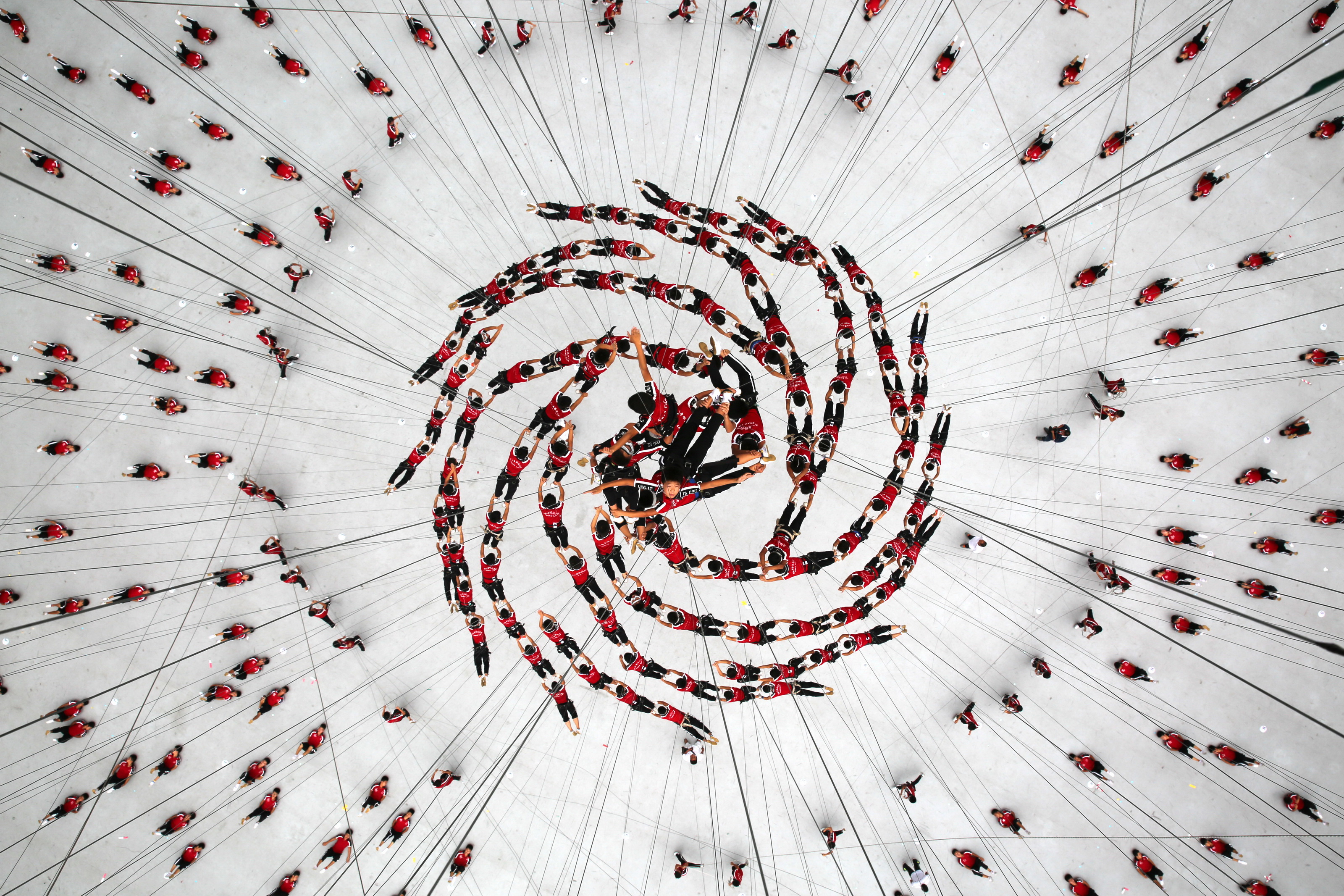
Performers from the Shaolin Tagou Martial Arts School rehearsing on Aug 9 for the ‘Build the Dream’ show in the opening ceremony of the Nanjing Youth Olympic Games.Chen Xiaodong/For China Daily
The Shaolin Tagou Martial Arts School, located near Shaolin Temple in Dengfeng at the foot of Henan’s Songshan Mountain, has participated in a series of major ceremonies at grand events, including the opening and closing ceremonies of the 2008 Beijing Olympic Games and Paralympic Games, the opening and closing ceremonies of the Guangzhou Asian Games, and 12 consecutive CCTV Spring Festival galas.
Tagou was established in 1978 when the government lifted the ban on private business. Its students range from those in kindergarten to the elderly. They come from all parts of the country to enroll in martial arts courses that take up to 14 years. The training costs about 5,000 yuan ($814) a year.
Shi Linlei, 16, a middle-school student who started training at Tagou three years ago, said that the physical training is harsher than what he had expected.
“At the beginning, I could not help crying when I called my mom and told her about the life here,” he said.
“The coaches are strict and there are no entertainment facilities like karaoke or cyberbars in the school.”
Shi said that he managed to get used to the tough training within a month, after the coaches gave them advice and helped them when they encountered difficulties.
The students also started to get along well with each other after several weeks because they are always told to be “polite and selfless”, he said.
Pan Guili, a businesswoman in Changsha, capital of Hunan province, said that even though her relatives had warned her about the possible violence in martial art schools, she still sent her 14-year-old son to one of them in early March.
Pan worried a lot about her son when he complained about being bullied by other students at the beginning of his training in the school.
“I told him that as a man, you should be strong and accept the rules there,” said Pan, who went to see her son on Aug 21.
“He has to live on his own or he will not get by when he enters society and starts looking for a job,” she said.
Importance of ethics
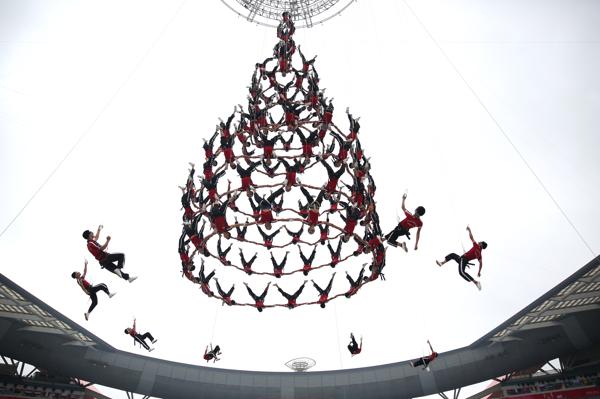
Performers from the Shaolin Tagou Martial Arts School rehearsing on Aug 9 for the ‘Build the Dream’ show in the opening ceremony of the Nanjing Youth Olympic Games.Chen Xiaodong/For China Daily
Liu Baoshan, 83, board chairman of the Shaolin Tagou Education Group, which runs six schools, including the Shaolin Tagou Martial Arts School, said ethics are an important part of its education.
“I have been concerned with one question for decades after I established the school - will the students become talented martial artists or rogues?” he said.
That is why teaching ethics is the top priority for the 35,000-odd students in the six schools of the education group, he said.
“Before learning martial arts, we should learn virtue first. The students are given ethics courses every day,” said Yang Songpo, a coach who taught in the Shaolin Tagou Martial Arts School for three years.
Some newcomers might not understand why they have to go through so many ethics courses, but they will gradually realize the importance of virtue, he said.
Many of the students are also “left-behind children”, whose parents have migrated to urban areas for work and left them in their rural homes. To foster better interaction and build teacher-student ties, coaches also live with their students in dormitories, eat with them in cafeterias and play games with them, Yang said.
“We are strict with the students in training and we are nice to them in their daily life,” he said. Such an approach helps, Yang said, citing an example of a rebellious student who improved his behavior and attitude after the teacher took care of him when he was ill.
Zhao Yibo, a teacher with the publicity department of the Shaolin Tagou Education Group, said that the students seem to be in high demand during the People’s Liberation Army’s Special Forces recruitment exercises.
“Because of their excellent physical condition, many students have become police officers and soldiers,” he said, adding that 48 students became SWAT members of Guizhou province in April.
Many students also choose to start an enterprise and teach martial arts after graduation, Zhao said.
“We teachers and coaches will do what we can to help the students fulfill their dreams,” he said.
“When my mom told me on the phone that she had watched the TV program and saw our aerial dance ‘Build the Dream’ during the 2014 Nanjing Youth Olympic Games opening ceremony, I felt that all my hard training had paid off,” said 16-year-old student Shi Linlei.
